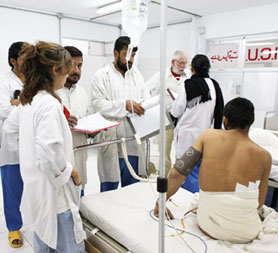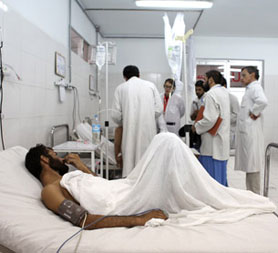Doctors working in the line of fire in Afghanistan
Medical professionals working in Afghan hospitals tell Channel 4 News of the highs and lows of providing frontline healthcare in a country ravaged by war.

Matteo Dell’Aira, Emergency Hospital Lashkar Gah
“To us, they are all civilians. We don’t ask which side they are on and lots of them are children. There are also lots of young men but they are patients, we don’t ask.
“We see lots of injuries caused by mines, bullets. Shell injuries. They all come here and have an operation. Our hospital is open 24 hours a day and they recover in more or less one week. So they come back for rehabilitation – but it is a quick turnover because we receive lots of patients.
Read more on Afghanistan: huge rise in war wounded civilians
“There are lots of losses of limbs – we are full of amputees and people who need prosthetics.
“Our staff now are highly trained and experienced. It depends on the injury [if people survive]…Infection is quite easy to control here.
“But it changes every week. For example, last week we had to amputate three limbs on the same person – one arm and two legs. We obviously do our best but he came after I don’t know how many hours and had lost a lot of blood. We lost him after two to three days.”
“The conditions are very difficult, it’s a very hard experience compared to jobs in the West. But it’s nice in a way because we don’t need the high tech equipment, and we train our Afghan colleagues.”

Michiel Hoffman, Medecins Sans Frontieres, Lashkar Gah
“Last February we came back into Afghanistan, specifically into one of the most severe conflict areas.
“Before, there was no service, no doctors, no nothing. The hospital was here but it was 90 per cent dysfunctional. Now the hospital is full and working. People don’t have to travel 100km through a war zone to get to a hospital.
“The war in Helmand is highly intense. It is essential for all military to stay away from the hospital…If there are military in the hospital, it becomes a target. All people who have guns have to stay away from hospitals.
“There is no such thing as a nice war wound. Even the simplest weapon has devastating medical consequences.
“The warring parties have an obligation to minimise civilian casualties but at the end of the day it is a war and if you are near a convoy or motorcycle that gets blown up, you will get blown up. War is not pretty.” Michiel Hoffman, Medecins Sans Frontieres representative in Afghanistan.
“Our inpatient mortality rate was 30 per cent – but now it is 6 per cent. That’s higher than the UK – where 3 per cent or so is normal – but people arrive too late. One of the biggest things is how difficult it is for Afghans to get here.
“The warring parties have an obligation to minimise civilian casualties but at the end of the day it is a war and if you are near a convoy or motorcycle that gets blown up, you will get blown up. War is not pretty.
“I don’t know the [military patient transfer] protocol – I hope it is purely medical but I don’t know. One thing is obvious – the prime function of military hospitals is to take care of the military. They have to keep beds free to take care of their soldiers.”

Christian Schuh, paediatric nurse at ICRC Mirwais Hospital, Kandahar
“For myself, this work for sure is challenging and sometimes hard, and I cannot compare it with my daily work at home in a German hospital in intensive care unit for newborn children.
“We see a lot of very sick patients because most of them come too late, because they have to travel very far. But there are also positive things – we are receiving every day positive feedback and we can feel that our presence is really wanted there from the relatives of our patients.
“The patients I see are facing indirect consequences of this war in Afghanistan.
The patients I see are facing indirect consequences of this war in Afghanistan…one out of four children does not reach school age. Christian Schuh, paediatric nurse at Mirwais Hospital, Kandahar.
“It’s always very positive when you have taken care with the local nurses for a premature baby, born at 1.2kg, been treated for 4-6 weeks, then the family takes this baby weighing 2kgs home, then you can see for what you have done with local nurses and family saying thank you for taking care of my child.
“But then we have negative experiences – every day we hear this report from the mother who arrives on the second, third or fourth day of the disease, with this child she had to travel for two days with. In her village or province there was no access for her to be seen earlier by a doctor.
“What we see here – the World Health Organisation (WHO) says 30 per cent of children in Afghanistan are underweight – our feeling is that it could be even more. WHO also says the mortality rate for children is 267 out of 1000 – that is so unbelievably high, one out of four does not reach school age. We are all working together to improve the quality of care.”
All images on this page were provided by Emergency and were taken in its Lashkar Gah hospital.




